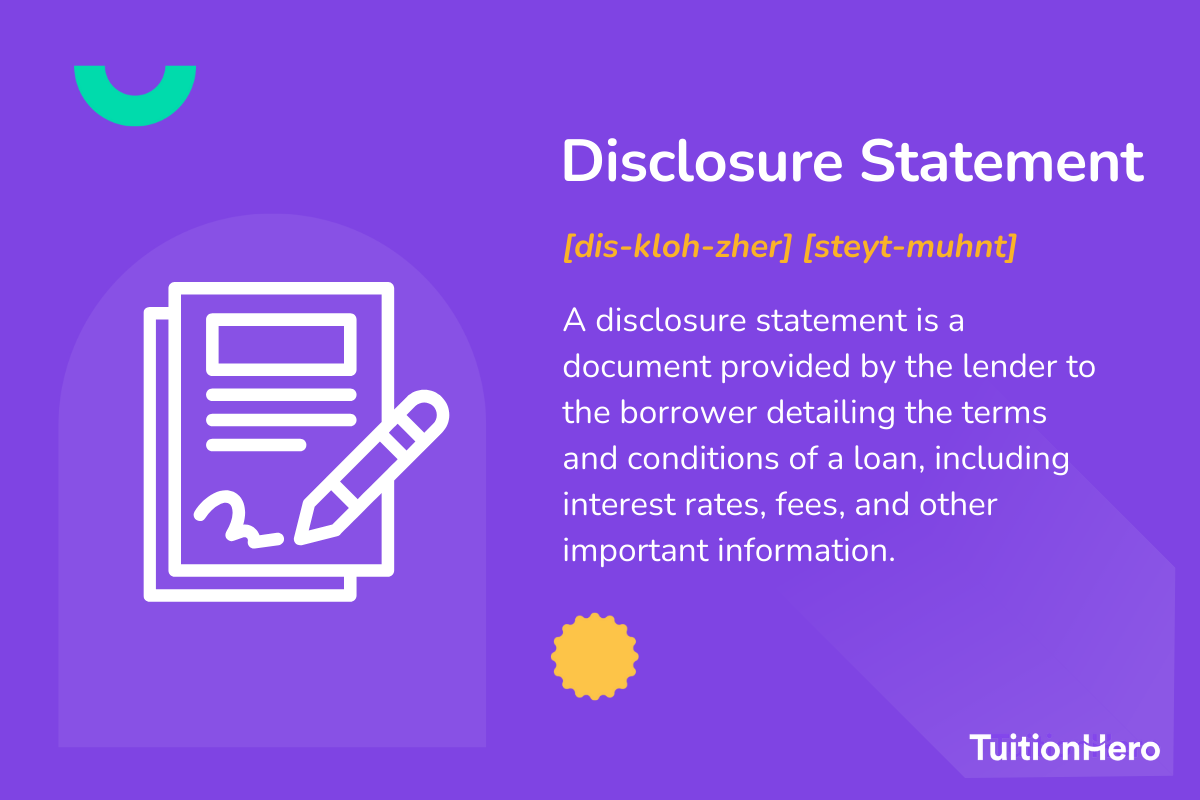Advertiser Disclosure
Last update: December 16, 2024
6 minutes read
What Is a Disclosure Statement?
Ever wondered what a disclosure statement really tells you? Learn how to navigate its terms to help you make smarter financial decisions.

By Brian Flaherty, B.A. Economics
Edited by Rachel Lauren, B.A. in Business and Political Economy
Learn more about our editorial standards



By Brian Flaherty, B.A. Economics
Edited by Rachel Lauren, B.A. in Business and Political Economy
Learn more about our editorial standards
In finances, especially when it comes to loans, understanding specific terms is crucial. A particular term causing lots of debate today is the "loan disclosure statement." Knowing the difference between this statement and similar financial documents can significantly affect your financial journey. In this post, you'll learn about the details of a loan disclosure statement and why it matters. Discover more about student loans.

Key takeaways
- Review loan disclosure statements carefully to understand your financial commitments
- Compare offers based on APR, fees, and repayment terms to make the best decision
- Ask for clarification or get advice if you're unsure about any terms
What is a loan disclosure statement?
A loan disclosure statement is a document that spells out the terms and conditions of a loan in straightforward, understandable language. It acts as a clear guide for borrowers, outlining what they're getting into before they finalize their loan agreement.
This statement includes vital information like the interest rate, any associated fees, the total amount borrowed, payment responsibilities, and any prepayment benefits.

Why is a loan disclosure statement important?
Knowing the details of their loan helps borrowers make informed decisions without worrying about missing anything in the fine print, especially when comparing loan offers. It serves as a protective measure, ensuring that all financial obligations and rights are transparent from the get-go.
Features to look out for include:
- Annual Percentage Rate (APR)
- Charges and fees associated with the loan
- Details concerning insurance and prepayment rights
Disclosure statements are provided with many different forms of borrowing, most notably mortgages and student loans. Whatever loan you’re taking out, understanding the details of the debt can help avoid more headaches in the future. For more in-depth knowledge on managing student loans, check out how to refinance your student loans.

TuitionHero Tip
Whether you're looking to finance your education or buy a home, understanding the specific terms laid out in these statements can significantly affect your financial health.
Let's talk more about disclosure statements and how they relate to your retirement plans. Knowing these details can help you make smart financial decisions - let’s break it down.
Disclosure statement details in retirement accounts
When considering retirement planning, it's essential to understand that each retirement account type has its own set of rules and conditions, clearly spelled out in their respective disclosure statements. The Federal government requires private retirement plans to make disclosure statements that lay out the details of how they work. These documents are crafted to make sure people are fully informed about their choices and the implications thereof.
Traditional and Roth IRAs
While government-sponsored retirement plans don’t have disclosure statements in the traditional sense, understanding the details of these plans is a helpful starting point to learn how private plans can differ.
For starters, Traditional IRAs allow pre-tax income investments, which grow tax-deferred, while Roth IRAs are funded with after-tax dollars and offer tax-free growth. These accounts can differ based on s contributions, tax status, and withdrawal regulations, so understanding the details is crucial for effective retirement planning.
Early withdrawals can also result in a penalty, and Traditional IRAs are often subject to mandatory withdrawals (known as required minimum distributions) when you reach a certain age.
Employer-sponsored plans
Then, there's the matter of employer-sponsored plans like the 401(k), SIMPLE IRA, and SEP IRA. These plans are required to come with disclosure statements. .
They highlight employer contributions (if applicable), eligibility criteria, and specifics around investment options and their performance. For instance, with a 401(k), you’ll see how your, and potentially your employer's, contributions can grow over time, as well as any matching terms and vesting periods.
Loan disclosure specifics
Loan disclosure statements are documents that explain information about different types of loans, like mortgages, student loans, and auto loans. These statements give you all the important details about the loan so you know what you're getting into before deciding to move forward.
Key loan terms
In the case of student and auto loans, for example, the disclosure statement will highlight the annual percentage rate (APR), the total amount being financed, and any upfront payments or fees. It also explains borrower responsibilities, late fees, and the consequences of default, acting as a go-to guide for understanding your loan.
Mortgage loans
Mortgage loan disclosures are known for detailing items like interest rates, monthly payments, and the effect of these terms over the life of the loan. It makes clear the rights to prepayment and any associated fees, allowing potential homeowners to plan their finances properly.
Compare private student loans now
TuitionHero simplifies your student loan decision, with multiple top loans side-by-side.
Compare Rates
Dos and don'ts of reviewing a loan disclosure statement
When it comes to reviewing a loan disclosure statement, being thorough is key. These documents contain crucial information about your loan terms, and understanding them fully can save you from unexpected issues down the line. Here's a quick guide to the do’s and don'ts in this process.
Do
Do review the annual percentage rate (APR) carefully.
Do compare the loan amount and terms with other offers.
Do check for any prepayment penalties.
Do make sure you understand all the terms listed.
Do look for the total cost of the loan over its lifetime.
Don't
Don't skim over the fees and penalties section.
Don't ignore the repayment terms and consequences of default.
Don't neglect to read about late payment policies.
Don't hesitate to ask for clarification on confusing terms.
Don't overlook the rights and responsibilities section.
Advantages and disadvantages of thoroughly reviewing loan disclosure statements
Thoroughly reviewing a loan disclosure statement before signing can seem challenging, but it’s an essential step in the borrowing process. This careful review makes sure you fully understand the commitment you're about to make, potentially saving you from financial pitfalls in the long run.
- You're better equipped to compare offers and choose the best one.
- Understanding APRs and fees prevents future surprises.
- Knowledge of prepayment rights can save you money in the long run.
- Awareness of penalties and default consequences helps in planning.
- May need legal or financial counseling to fully understand.
- Could delay the loan application process.
- Might cause anxiety or confusion because of complex financial terms.

Why trust TuitionHero
At TuitionHero, we simplify college finance for students and parents. Our resources guide you through choosing private loans, understanding loan disclosures, and securing scholarships. Our tools make applying for loans and refinancing easy. With our help, you can focus on achieving your educational goals.
Frequently asked questions (FAQ)
If there's any part of your loan disclosure statement that isn't clear, don't hesitate to contact your lender for clarification. It's essential that you fully understand all the terms and conditions of your loan before agreeing to them.
Lenders are there to help and should be able to explain any complex terms or conditions in simpler language. You might also consider seeking advice from a financial advisor for an independent perspective.
While some terms in your loan disclosure statement might seem non-negotiable, it doesn't hurt to ask the lender if there's any flexibility. Interest rates, for example, may have some room for negotiation depending on your creditworthiness and the lender's policies.
Always approach such discussions with a clear understanding of what you're seeking and why it's justified. Some lenders may be willing to match an interest rate you get elsewhere in order to earn your business. Remember, however, that not all terms will be flexible.
Yes, different types of loans have different kinds of disclosure statements. For instance, a mortgage loan disclosure statement will contain information specific to real estate transactions, like escrow account details and information about property value.
Similarly, student loan disclosures will focus on aspects relevant to educational funding, like deferment options and the estimated monthly repayment amount upon graduation. Understanding the specifics of each type of loan disclosure is crucial to managing your financial obligations effectively.
Final thoughts
Understanding your loan disclosure statement is more than just a step in securing a loan; it's a step toward informed financial decisions. As you dive into loans, whether for education, a car, or a home, remember that knowledge is your best ally.
At TuitionHero, we’re committed to giving you the resources and insights you need to make smart financial choices. From understanding loan agreements to choosing the right student loans that fit your financial situation, we're here to support you every step of the way. Visit us for more help on managing your student loans, and get the knowledge you need to support your education goals.
Source
Author

Brian Flaherty
Brian is a graduate of the University of Virginia where he earned a B.A. in Economics. After graduation, Brian spent four years working at a wealth management firm advising high-net-worth investors and institutions. During his time there, he passed the rigorous Series 65 exam and rose to a high-level strategy position.
Editor

Rachel Lauren
Rachel Lauren is the co-founder and COO of Debbie, a tech startup that offers an app to help people pay off their credit card debt for good through rewards and behavioral psychology. She was previously a venture capital investor at BDMI, as well as an equity research analyst at Credit Suisse.
At TuitionHero, we're not just passionate about our work - we take immense pride in it. Our dedicated team of writers diligently follows strict editorial standards, ensuring that every piece of content we publish is accurate, current, and highly valuable. We don't just strive for quality; we aim for excellence.
Related posts
While you're at it, here are some other college finance-related blog posts you might be interested in.
Shop and compare student financing options - 100% free!

Always free, always fast
TuitionHero is 100% free to use. Here, you can instantly view and compare multiple top lenders side-by-side.

Won’t affect credit score
Don’t worry – checking your rates with TuitionHero never impacts your credit score!

Safe and secure
We take your information's security seriously. We apply industry best practices to ensure your data is safe.
Finished scrolling? Start saving & find your private student loan rate today





